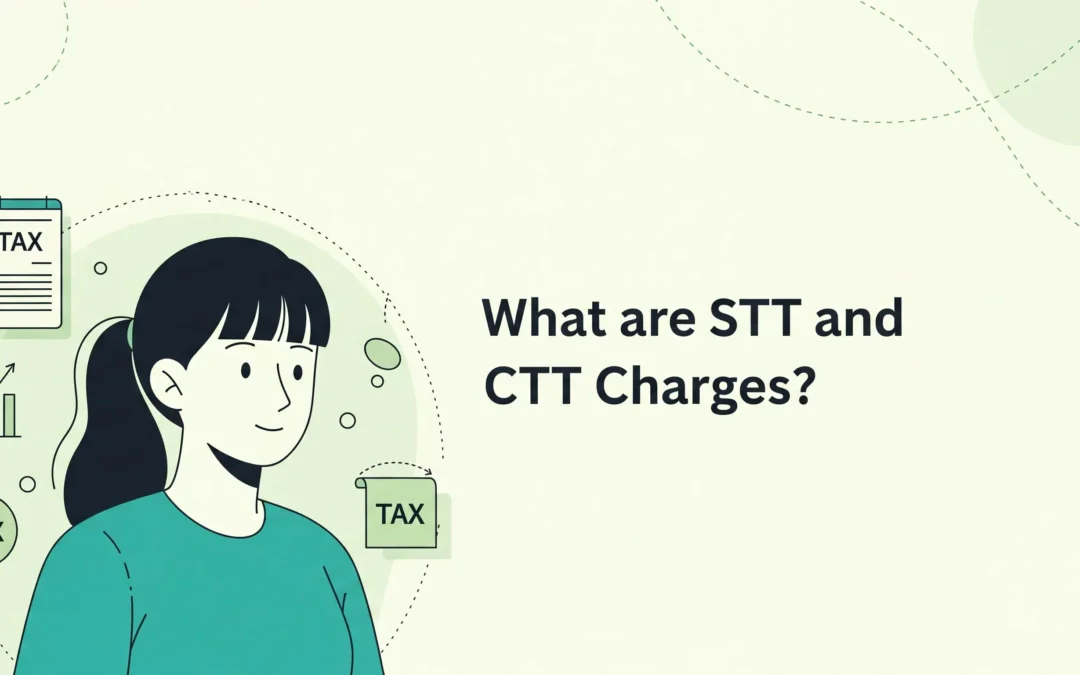So, you’ve started investing in stocks or commodities in India, maybe you’re just dipping your toes in, trying to figure out what’s what. Well, if that’s you, chances are you’ve already bumped into ‘STT’ and ‘CTT.’ And look, these aren’t just some boring financial terms; they’re a pretty big deal.
They’re going to directly affect how your trades get taxed, and that, my friend, is going to seriously impact how much cash you get to take home.
What is STT (Securities Transaction Tax)?
Securities Transaction Tax (STT): It is a tax charged on every buy or sale of securities listed on Indian stock exchanges, mainly BSE and NSE. STT was introduced in the year 2004 by the Government of India. STT aimed to reduce tax evasion and boost transparency in capital market transactions across all the segments.
STT applies to various financial instruments such as:
- Equity shares
- Mutual funds primarily invest in equities (but only if traded on an exchange)
- Futures and options (F&O) derivatives.
When and How Is STT Charged?
STT is deducted automatically at the time of the transaction by your broker, and you can see it in your contract note. The rates vary depending on the type of security and the quantity of shares being bought or sold, with the total money for executing the trade.
An overview of the current STT rates:
| Instrument | Transaction Type | STT Rate |
| Equity delivery | Purchase & Sale | 0.1% on both sides |
| Intraday equity | Sale only | 0.025% |
| Equity futures | Sale only | 0.0125% |
| Equity options | Sale only | 0.0625% on premium |
| Mutual funds (equity-oriented) | Sale only | 0.001% |
Therefore, if you purchase shares and keep them (a delivery trade), STT will be charged when you buy and again when you sell. If you’re an intraday trader, you only pay STT when selling.
What is CTT (Commodities Transaction Tax)?
While STT deals with taxation in the stock market. Similarly, Commodities Transaction Tax (CTT) applies to trades in the commodity derivatives market. CTT was later introduced, in July 2013, and it applies to non-agricultural commodity derivatives such as gold, silver, crude oil, and industrial metals.CTT is meant to bring equality in taxation between securities and commodities markets, and also to add transparency and maintain discipline in commodity trades.
How Is CTT Applied?
CTT is not levied on all commodity trades. Here are some common CTT rates:
| Instrument | Transaction Type | CTT Rate |
| Non-agricultural commodity futures | Sale | 0.01% (on trade value) |
| Non-agri commodity options | Sale | 0.05% (on premium) |
| Agri-commodity contracts | NA | No CTT applicable |
This means, for example, if you’re trading crude oil futures and you sell the contract, CTT will be charged on the total contract value of the position. And on the agricultural commodities/products(like wheat, soybeans, cotton, or any other agricultural product), there is no CTT charged.
STT vs CTT: Key Details:
STT and CTT, though conceptually similar, govern distinct markets with their own rules. A comparison follows:
| Aspect | STT | CTT |
| Full form | Securities Transaction Tax | Commodities Transaction Tax |
| Introduced in | 2004 | 2013 |
| Applicable on | Equity shares, equity mutual funds, F&O | Non-agricultural commodity derivatives |
| Collected on | Buy & sell (equity delivery), sale (F&O, intraday) | Sale of futures/options |
| Exemptions | Debt instruments, currency derivatives | Agricultural commodities |
Why Do STT and CTT Matter for Investors?
These transaction taxes might seem like small percentages, but they can have a huge impact, especially for frequent traders or those working with large volumes of trades, as it applied on buy and sell. It is not about the loss or the profit, the charges are must.
Moreover, STT is allowed as a deduction under Section 36 of the Income Tax Act if you’re declaring your trading income as business income. However, if your trading falls under capital gains, then STT is not deductible, but it helps determine the tax treatment.
In Closing
While STT and CTT might initially seem like technical terminology, they’re actually straightforward once you understand the basics and control your overtrades. They’re essentially tools used by the government to tax and regulate transactions in the financial and commodity markets.
Understanding precisely when and how these charges hit your trades is key to avoiding any unwelcome shocks when you review your P&L. For anyone active in the stock or commodity markets, it’s non-negotiable; the charges are to be paid.
In a nutshell:
- STT applies to stocks and equity derivatives.
- CTT applies to non-agricultural commodities.
- Both are charged at the point of transaction and reduce your overall profit.


